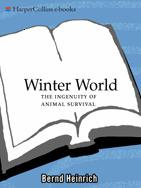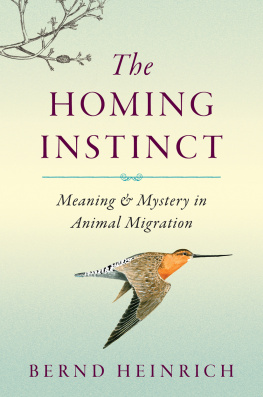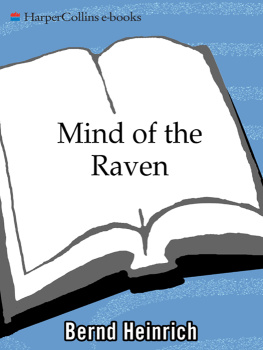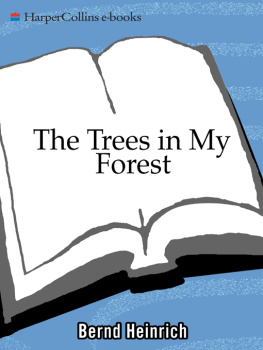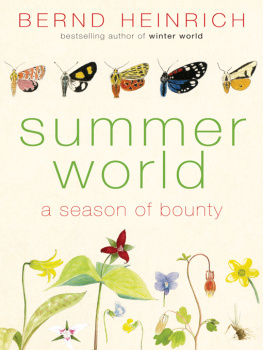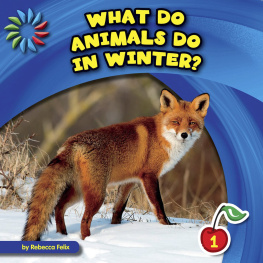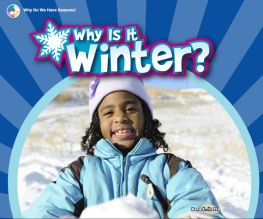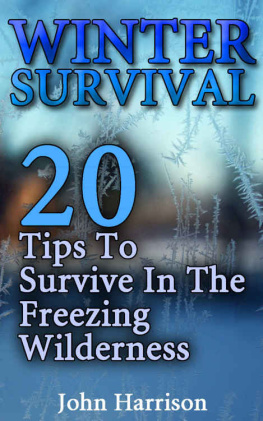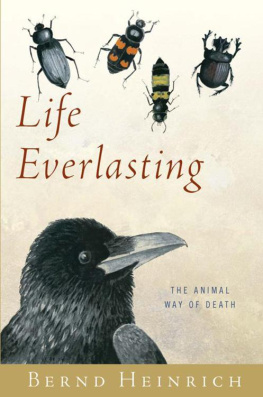
BERND HEINRICH
WINTER WORLD
The Ingenuity of Animal Survival

CONTENTS
Introduction
A Note on Terms and Definitions
| Fire and Ice |
|
| Snow and the Subnivian Space |
|
| A Late Winter Walk |
|
| Tracking a Weasel |
|
| Nests and Dens |
|
| Flying Squirrels in a Huddle |
|
| Hibernating Squirrels (Heating Up to Dream) |
|
| The Kinglets Feathers |
|
| The Kinglets Winter Fuel |
|
| Hibernating Birds |
|
| Torpid Turtles under Ice |
|
| Iced-in Water Rodents |
|
| Frozen Frogs on Ice |
|
| Insects: From the Diversity to the Limits |
|
| Mice in Winter |
|
| Supercool(ed) Houseguests (with and without Antifreeze) |
|
| Of Bats and Butterflies and Cold Storage |
|
| Aggregating for Winter |
|
| Winter Flocks |
|
| Berries Preserved |
|
| Bears in Winter |
|
| Storing Food |
|
| Bees Winter Gamble |
|
| Winter Buds |
|
| The Kinglets Key? |
|
References
Searchable Terms
Acknowledgments
About the Author
Cover
Copyright
About the Publisher
INTRODUCTION
When I was a teenage boy in western Maine, I read the books of Jack London, books about a world of rugged people and hardy animals at home in the frozen woods of the north. Dreaming of that world, I ventured out into the forest on snowshoes, and if it was in the middle of a storm, all the better. Deep in the forest I would dig a shallow pit in the snow and using the papery bark peeled from a nearby birch tree and dead twigs broken from a red spruce, Id start a crackling fire. The splendor of sparks shooting up into the dark sky, the acrid smoke rising through the falling snowflakes, and hare or porcupine meat roasting on a stick over the flames, all enhanced the winter romance. Warming myself, I would think of Londons To Build a Fire, a story about how in the northern wilderness, heat meant life. To one unfortunate newcomer in the frozen Yukon in that story, the key to life was keeping dry and having a match, but because of careless mistakes, he got his feet wet and his fire and life were extinguished.
The trouble with that newcomer, London wrote, was that he was without imagination. He was quick and alert in the things of life, but only in the things. Not in the significances. Fifty degrees below zero meant eighty-odd degrees of frost[it] was to him just precisely fifty degrees below zero. That there should be anything more to it than that was a thought that never entered his head. The newcomer, the cheechako, knew about the abstract thing, frost, and the numbers. But he did not yet know what they meant . And with good reason, too, as were adapted to a tropical environment and maintain it around ourselves all year long, through our housing and our clothing. Most of us already feel uncomfortable experiencing 32F (or 0C), the temperature at which water turns into ice. What would we know of -50F? We dont experience such temperatures, so we can hardly imagine how animals survive; by the time the winter world descends, most of us have surrounded ourselves in an artificial tropics.
In my Jack Londonobsessed adolescent self, I may have occasionally experienced chilling, but it was not sufficient to grab my attention. I was focused on making each of my outings into the winter woods an adventure. I remember creeping out of my bed with two friends at school one midnight to ski in the milky moonlight through the pine and hemlock woods by Martin Stream, in western Maine. In our minds we were on the Dawson Trail in the Yukon, where we had to be tough. After all, anything could happen at the edge. In our imaginations we could fairly hear the huskies breath, and the dogs barking at a distant farm seemed like howling wolves. Just as London said, the northern lights flickered under greenish-purple curtains draping the heavens, giving legitimacy to our fantasies. A barred owl hooted nearby in the dark cedar swamp, snowshoe hares crisscrossed the balsam fir thickets in utter silence, and deer went on their errands over the ridges. Yet we were unconscious of the many other worlds of these creatures, and scarcely thought of how animals survived temperature extremes ranging down to -50C. Like the cheechako on his first winter, I was without imagination because I was without experience.
Each species experiences the world differently, and many species have capacities that are far different from ours. They can show us the unimaginable . Thus, the greater our empathy with a variety of animals, the more we can learn. For example, nobody on their own would seek to collect a fluid that is practically indistinguishable from water out of a specific kind of tree, then evaporate it to produce sugar. But the Iroquois, the native people of New York State, say that maple syrup was discovered by a boy who noticed a squirrel licking some maple sap at a wound where the water had evaporated. He had discovered a squirrels winter food. Curious, the boy tried the sap himself. Finding it sweet, he began the tribes use of a new resource. Similarly, prior to actually observing by eavesdropping with sophisticated electronic equipment, nobody would have suspected that bats see the world with their ears, that elephant seals dive down to a mile in depth and can stay down an hour, that moths can smell a mate from a mile away, or that birds fly nonstop across oceans.
One of the early theories (by nineteenth-century German biologist Carl Bergmann) that relates to the winter world, which is now enshrined as Bergmanns Rule, is that northern animals are larger in size than their southern congeners, to allow them to better conserve the body heat that is generally costly to produce. It is therefore perhaps not surprising that the worlds largest of the Passeriformes (the most common and species-rich group of birds), the common raven ( Corvus corax ), is a northern bird, and the largest individuals of this species live from Maine to Alaska. But as with most rules, Bergmanns applies only if everything else is equal. It never is; the worlds smallest perching bird shares the ravens northern range, even in winter, and it weighs as little as 1/325 the weight of a large raven. This northern companion to ravens, the golden-crowned kinglet ( Regulus satrapa ) weighs in at about 5 gramsthe same as two pennies. It is scarcely larger than a ruby-throated hummingbird or a pygmy shrew, yet it appears to thrive in the northern winter woods. I saw these tiny birds on my boyhood excursions into the winter woods of Maineand I see them now, and am still amazed when I step out in the morning after a cold night and Im greeted by them. Our fragility in the cold makes the survival of these tiny creatures all the more miraculous.
Next page
